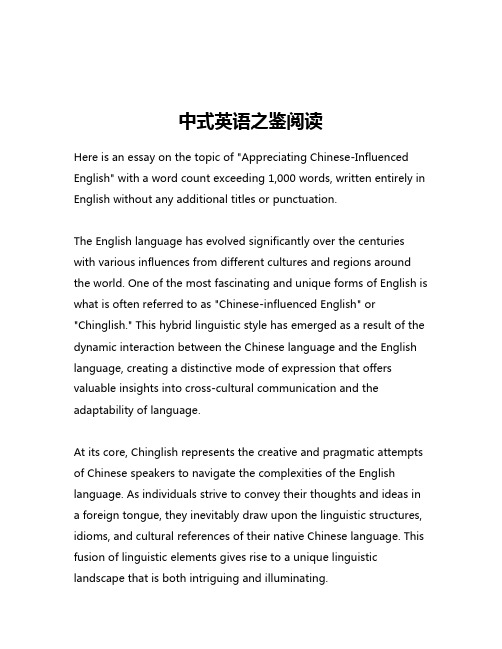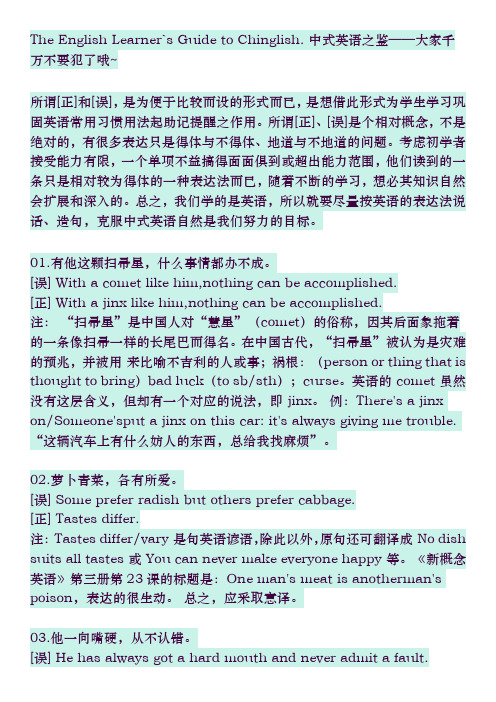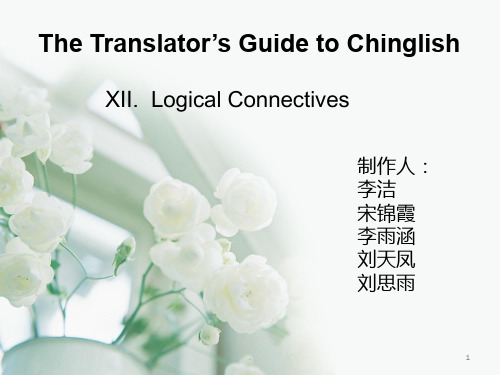中式英语之鉴电子版
中式英语之鉴

丹尼斯自己不努力,还老是眼红别人的 成就。
[误] Denis himself doesn’t work hard, however, he is always red-eyed of other people’s achievements. [正] Denis himself doesn’t work hard, however, he is always green-eyed of other people’s achievements. 注:中国人说一个人嫉妒用“眼红”,但英美人则用 “眼绿”来形容。英语的 green 除了表示颜色之外还有 “嫉妒”的意思,又如:I was absolutely green when I saw his splendid new car(我看到他那辆漂亮的新 车非常眼红)。其实,英语中许多表示色彩的词汇都有 特殊的含义,不能照字面去理解。再比如:He gave me a black look(他恶狠狠地蹬了我一眼);She visits
中式英语之鉴
汉语是我们的母语。
[误] Chinese is our mother language .[正] Chinese is our mother tongue. 注:tongue 除了指“舌头”,还可以用来指 “语言,方言”,如 the Spanish tongue 并非指“西班牙舌头” ”,而是指“西班牙 语”。我们常说的有“语言天赋”,英语里 相应的表达是 the gift of tongues.
对不起,我把课本忘在家里了。
[误] Sorry, I forgot my textbook at home. [正] Sorry, I left my textbook at home. 注:原文中的“忘”是指“落在家里” 的意思,不能翻译成英文的 forget, 而应用表示“把„留在某地,丢下,
中式英语之鉴第十二部分PPT课件

2021/7/24
3
Examples of logical connectives
In this part, we are going to talk about some examples to show how the logical connectives make the text sufficient and easier to understand.
Then, let’s think something about the
logical connectives.
A logical connective (also called a
logical operator) is a symbol or word used
to connect two or more sentences (of
2021/7/24
2
We are going to analyze it in the following aspects: Examples of logical connectives Types of logical connectives Examples of missing links Dubious logical connectives Wrong logical connectives Examples of revision
2021/7/24
5
Examples of logical connectives
Two sentences needed to be connected logically require coordinating conjunctions. E.g. Luo’s art is based on traditional techniques, but he does not allow himself to be restricted by tradition. (two independent clauses) Luo’s art is based on traditional techniques. But he does not allow himself to be restricted by tradition. (two sentences)
中式英语之鉴阅读

中式英语之鉴阅读Here is an essay on the topic of "Appreciating Chinese-Influenced English" with a word count exceeding 1,000 words, written entirely in English without any additional titles or punctuation.The English language has evolved significantly over the centuries with various influences from different cultures and regions around the world. One of the most fascinating and unique forms of English is what is often referred to as "Chinese-influenced English" or "Chinglish." This hybrid linguistic style has emerged as a result of the dynamic interaction between the Chinese language and the English language, creating a distinctive mode of expression that offers valuable insights into cross-cultural communication and the adaptability of language.At its core, Chinglish represents the creative and pragmatic attempts of Chinese speakers to navigate the complexities of the English language. As individuals strive to convey their thoughts and ideas in a foreign tongue, they inevitably draw upon the linguistic structures, idioms, and cultural references of their native Chinese language. This fusion of linguistic elements gives rise to a unique linguistic landscape that is both intriguing and illuminating.One of the most prominent features of Chinglish is the direct translation of Chinese idioms and expressions into English. This process, known as "literal translation," often results in phrases that may seem nonsensical or humorous to native English speakers, but which carry profound meaning and cultural significance in the Chinese context. For instance, the Chinglish phrase "the old man under the tree" might be a direct translation of the Chinese idiom "树下老人," which refers to a wise and experienced individual who imparts valuable knowledge and guidance. Similarly, the expression "to add oil" in Chinglish is a literal translation of the Chinese phrase "加油," which is used to encourage and motivate others. These linguistic quirks not only highlight the differences between the two languages but also offer a glimpse into the unique worldviews and cultural perspectives of Chinese speakers.Moreover, Chinglish often reflects the influence of Chinese grammatical structures on the usage of English. Chinese is a language that is characterized by its conciseness and the omission of certain grammatical elements, such as articles and pronouns. When Chinese speakers translate these linguistic features directly into English, the result can be sentences that appear incomplete or unconventional to native English speakers. For example, the Chinglish phrase "I go to school" might be a direct translation of the Chinese sentence "我去上学," where the pronoun "I" and the article"the" are omitted. While this construction may seem unnatural in standard English, it reflects the underlying logic and linguistic patterns of the Chinese language.Interestingly, Chinglish also showcases the creative and adaptive nature of language. As Chinese speakers grapple with the challenges of expressing themselves in English, they often develop novel ways of using words and phrases that defy the conventional norms of the language. This linguistic creativity can be seen in the coining of new terms, the repurposing of existing words, and the blending of Chinese and English elements. For instance, the term "self-service" in Chinglish might be used to refer to a situation where an individual is expected to take care of their own needs, rather than relying on the assistance of others. This innovative usage of the term "self-service" reflects the practical and resourceful mindset of Chinese speakers as they navigate the linguistic landscape of English.Furthermore, Chinglish can be seen as a testament to the resilience and adaptability of the English language. As it encounters and assimilates influences from diverse cultural and linguistic backgrounds, English demonstrates its remarkable capacity to evolve and accommodate new forms of expression. The emergence of Chinglish not only enriches the global tapestry of English but also highlights the language's ability to serve as a medium for cross-cultural exchange and understanding.In the realm of business and international communication, Chinglish can play a crucial role in bridging cultural divides and facilitating effective dialogue. As Chinese companies and individuals engage with the global marketplace, their use of Chinglish can provide valuable insights into their thought processes, cultural references, and communication styles. By understanding and appreciating the nuances of Chinglish, native English speakers can cultivate a deeper appreciation for the cultural context and perspectives of their Chinese counterparts, ultimately leading to more productive and meaningful exchanges.Moreover, the study of Chinglish can offer valuable lessons in language learning and intercultural communication. By examining the patterns and mechanisms underlying Chinglish, linguists and educators can gain valuable insights into the challenges and strategies employed by language learners. This knowledge can inform the development of more effective language teaching methodologies and materials, helping to bridge the gap between the Chinese and English languages and fostering greater cross-cultural understanding.In conclusion, the phenomenon of Chinglish is a fascinating and multifaceted aspect of the English language. It represents the creative and adaptive efforts of Chinese speakers to navigate thelinguistic landscape of English, while also reflecting the rich cultural heritage and unique perspectives of the Chinese language. By appreciating and studying Chinglish, we can gain a deeper understanding of the dynamic interplay between language and culture, and the remarkable resilience and adaptability of the English language as it continues to evolve and embrace diverse influences from around the world.。
《中式英语之鉴》电子版

The English Learner`s Guide to Chinglish. 中式英语之鉴——大家千万不要犯了哦~所谓[正]和[误],是为便于比较而设的形式而已,是想借此形式为学生学习巩固英语常用习惯用法起助记提醒之作用。
所谓[正]、[误]是个相对概念,不是绝对的,有很多表达只是得体与不得体、地道与不地道的问题。
考虑初学者接受能力有限,一个单项不益搞得面面俱到或超出能力范围,他们读到的一条只是相对较为得体的一种表达法而已,随着不断的学习,想必其知识自然会扩展和深入的。
总之,我们学的是英语,所以就要尽量按英语的表达法说话、造句,克服中式英语自然是我们努力的目标。
01.有他这颗扫帚星,什么事情都办不成。
[误] With a comet like him,nothing can be accomplished.[正] With a jinx like him,nothing can be accomplished.注:“扫帚星”是中国人对“慧星”(comet)的俗称,因其后面象拖着的一条像扫帚一样的长尾巴而得名。
在中国古代,“扫帚星”被认为是灾难的预兆,并被用来比喻不吉利的人或事;祸根:(person or thing that is thought to bring)bad luck(to sb/sth);curse。
英语的 comet 虽然没有这层含义,但却有一个对应的说法,即 jinx。
例:There's a jinxon/Someone'sput a jinx on this car: it's always giving me trouble. “这辆汽车上有什么妨人的东西,总给我找麻烦”。
02.萝卜青菜,各有所爱。
[误] Some prefer radish but others prefer cabbage.[正] Tastes differ.注: Tastes differ/vary 是句英语谚语,除此以外,原句还可翻译成 No dish suits all tastes 或 You can never make everyone happy 等。
中式英语之鉴第十二部分PPT课件

either a formal or a natural language) in a
grammatically valid way, such that the
sense of the compound sentence
produced depends only on the original
sentences.
.
8
Examples of logical connectives
.
7
An example of adverbs used in Chinese publications :
In new China, men and women– especially women, who suffered most from feudal oppression– have gained freedom of marriage and equal rights. Thus, in our new society they are taking a greater part in all kinds of political activities and in all fields of construction.
The Translator’s Guide to Chinglish
ΧΙΙ. Logical Connectives
制作人: 李洁 宋锦霞 李雨涵 刘天凤 刘思雨
.
1
We talked many about unnecessary
words and sentence structure before.
Then, let’s think something about the
中式英语之鉴第十二部分

Two sentences needed to be connected logically require coordinating conjunctions. E.g. Luo‘s art is based on traditional techniques, but he does not allow himself to be restricted by tradition. (two independent clauses) Luo‘s art is based on traditional techniques. But he does not allow himself to be restricted by tradition. (two sentences)
The problem of Chinese translators is that running less risk of sprinkling a text with too many ―however‖s and ―moreover‖s than of failing to insert enough of conjunctions to provide coherence.
The Translator’s Guide to Chinglish
ΧΙΙ. Logical Connectives
制作人: 李洁 宋锦霞 李雨涵 刘天凤 刘思雨
We talked many about unnecessary words and sentence structure before. Then, let‘s think something about the logical connectives. A logical connective (also called a logical operator) is a symbol or word used to connect two or more sentences (of either a formal or a natural language) in a grammatically valid way, such that the sense of the compound sentence produced depends only on the original sentences.
《中式英语之鉴》第2周

《中式英语之鉴》第2周Exercise 11)Since the publication of the Automotive Industrial Policy last July, the "family car" has been one of the hottest topics of discussion in the Chinese press.2 ) the drafting of important documents has been completed ahead of schedule.3 ) we should improve the overall balance of the economy4) this will convince the people that you are sincere in carrying out (or: that you are wholeheartedly committed to) the policies of reform and opening to the outside world5) in the final analysis, the growth of the CPC, the achievement of national independence, and China's advance toward strength and prosperity closely linked to ( or,better: were largely made possible by ) the drive to liberate and expand the forces of production6 ) The last decade of this century will be crucial for laying a foundation and creating good conditions for economic development in the first half of the next.7) as long as the ranks of the Party are closely united and remain vigorous, the cause of socialism is bound to prosper8)if the reform is successful, 'tt will lay a solid foundation for stable development (in China) over the next few decades9 ) the purpose of political reform is to improve and revitalize China'ssocialist system1b) actually, as means of developing the productive forces, different managerial forms can serve both capitalism and socialismI1)when we have dealt with those problems, our established principles and policies will only he carried out more smoothly and perseveringly12 ) What obstacles are we going to run into? As I see it, there are two or three problems that might hold up the growth of our economy.13) Mou Xinsheng, Vice-Minister of Public Security, urged public security organs to cooperate closely with banks in cracking down on white-collar crime.14) Leading comrades of Party committees and governments at all levels should often visit schools,listen to what the teachers and students have to say, and help them overcome their difficulties.15)We are not rich and cannot offer you much financial help, but we can share our experience with our friends, and that too is a kind of help.1b f It was then that Mao Zedong showed his outstanding ability to learn from bath positive and negative experience.17) So China must not allow itself to get out of control; we have the responsibility to ourselves and to all mankind.18 ) We must therefore continue to uphold Mao Zedong Thought am enrich it with new principles and new conclusions corresponding to reality.19) Of course, the report reflects my views, but in the main it embodies collective opinions.2(1y After years of study, the State Bureau of Cultural Relics has agreed to unearth the much-talked-about No. Z vault o# terra-cotta soldiers, Yuan Zhangyi, President of the Terra-cotta Museum, said recently at Lintong, where the museum is located .Exercise 21) Enterprises with exclusively foreign investment should abide by China's laws ( and regulations).2) we should try our best(or:do everything possible)to keep prices from rocketing3 ) The initiative in the war has shifted from the enemy to us.4) there will be a great many economic imbalance,which it will take a long time to remedy5 ) people who have made mistakes should be allowed to compensate by performing good deeds, provided they quickly come to realize their mistakes and make up their minds to mend their waysb) industrial enterprises should manufacture products for both military and civilian use7) We must expand and accelerate the production of import substitutes.8) although the campaign is necessary, it should not go beyond these three months9) We should expand the patriotic health campaign and improve the system of primary health Bare and the training of health workers at the grass roots.10) We veterans should take advantage of this opportunity to read and increase our knowledge; if we let it slip, we may regret it when it's too late.11)Family planning should be combined with efforts to help poor areas become prosperous.12) cadres should adopt an active attitude toward this work (Or. better: cadres should take an active interest in this world13) Promoting socialist cultural and ideological progress. (Car,better: Promoting progress in socialist culture and ideology.)14) There will be full employment.15) Our policy is firm, and we are not going to change it.1b) friendly contacts and trade relations between the Chinese a} Japanese peoples have steadily developed (or: expanded)17) To promote democracy at the village level and to advance rural development, governments at different levels must implement the Organic Law of Villagers’Committees, ensuring that villagers manage their own affairs.18) This does toot mean, however, that we can concentrate (exclusively) on industrial development to the neglect of agriculture which nowrepresents nearly 90 per cent of the economy.19) We must, in particular, put a stop to the unauthorized use of arable land and the destruction of forests,and promote the planting of trees and grass in both town and country.20 ) This year we hope to make great progress in this regard.。
2中式英语之鉴

Unnecessary Modifiers中式英语之鉴冗余性修饰语可以分为5类:1. 冗余修饰语2. ⾃明修饰语3. 强调成分4. 限定修饰词(尤指形容词或副词)5. 陈词滥调冗余修饰语许多从中⽂翻译过去的形容词和副词,在英语中是多余的。
定义:其含义已经包含或隐含在句⼦其他成分或被修饰成分中的形容词和副词。
明显的冗余修饰语,如:advance forecast [天⽓预报本身就是提前的]female businesswoman Liu Zhihua [woman包含了female⼥性的意思]new innovations[发明包含了新的含义]mutual cooperation[合作本身就是共同的,双⽅或多⽅的]可省略:被修饰成分⾃带含义,约定俗成的表达,⼥性化/男性化的名字(⽆需强调性别)或者逻辑⾃带。
时间副词还有⼀类经常出现在中式英语中的冗余性修饰语就是表示动作发⽣时间的副词和表达时间的名词短语,如:at present, in the future, in the past,因为它们的含义已经通过动词的时态表达出来了。
A: now the government is working hard to improve taxationB: the government is working hard to improve taxation[现在进⾏时包含“现在“]A: previously we used to overemphasize the need for class struggleB: we used to overemphasize the need for class struggle[过去时包含”之前“]“Various”另⼀个中式英语中典型的冗余修饰语就是形容词“various”。
在中⽂中,“various”经常⽤来表示复数,但在英语⾥,复数已经以名词结尾-s的形式出现了,所以⽆需赘述。
- 1、下载文档前请自行甄别文档内容的完整性,平台不提供额外的编辑、内容补充、找答案等附加服务。
- 2、"仅部分预览"的文档,不可在线预览部分如存在完整性等问题,可反馈申请退款(可完整预览的文档不适用该条件!)。
- 3、如文档侵犯您的权益,请联系客服反馈,我们会尽快为您处理(人工客服工作时间:9:00-18:30)。
The?English?Learner`s?Guide?to?Chinglish.?中式英语之鉴——大家千万不要犯了哦~所谓[正]和[误],是为便于比较而设的形式而已,是想借此形式为学生学习巩固英语常用习惯用法起助记提醒之作用。
所谓[正]、[误]是个相对概念,不是绝对的,有很多表达只是得体与不得体、地道与不地道的问题。
考虑初学者接受能力有限,一个单项不益搞得面面俱到或超出能力范围,他们读到的一条只是相对较为得体的一种表达法而已,随着不断的学习,想必其知识自然会扩展和深入的。
总之,我们学的是英语,所以就要尽量按英语的表达法说话、造句,克服中式英语自然是我们努力的目标。
01.有他这颗扫帚星,什么事情都办不成。
[误] With a comet like him,nothing can be accomplished.[正] With a jinx like him,nothing can be accomplished.注:?“扫帚星”是中国人对“慧星”(comet)的俗称,因其后面象拖着的一条像扫帚一样的长尾巴而得名。
在中国古代,“扫帚星”被认为是灾难的预兆,并被用?来比喻不吉利的人或事;祸根:(person or thing that is thought to bring)bad luck(to sb/sth);curse。
英语的?comet?虽然没有这层含义,但却有一个对应的说法,即?jinx。
?例:There's a jinx on/Someone'sput a jinx on this car: it's always giving me trouble. “这辆汽车上有什么妨人的东西,总给我找麻烦”。
02.萝卜青菜,各有所爱。
[误] Some prefer radish but others prefer cabbage.[正] Tastes differ.注:?Tastes differ/vary?是句英语谚语,除此以外,原句还可翻译成?No dish suits all tastes?或?You can never make everyone happy?等。
《新概念英语》第三册第23课的标题是:One man's meat is anotherman's poison,表达的很生动。
?总之,应采取意译。
03.他一向嘴硬,从不认错。
[误] He has always got a hard mouth and never admit a fault.[正] He never says uncle.注:?say (cry) uncle: to give up or in; to surrender; to admit defeat. Mainly used by boys, as when fighting。
主要是男孩们打架时的用语,当一方想制服另一方时,就用命令的口气说:“Say uncle!”这时,有的孩子为了表示不服输,就是不说。
后来,say uncle?就成了“服输”的代名词,而?not say uncle?就相当于“嘴硬”了。
04.老师很喜欢这个嘴甜的小姑娘。
[误] The teacher likes this sweet-mouthed little girl very much.[正] The teacher likes this honey-lipped little girl very much.注:中国人喜欢说“嘴甜”,但?honey-lipped?更符合英美人的语言习惯。
05.同学们都很讨厌他,因为他经常拍老师的马屁。
[误] The student all dislike him because he often pats the teacher's ass.[正] The students all dislike him because he often licks the teacher's boots.注:?以前在欧洲,臣民见到国王与王后往往要葡匐到在,亲吻他们的靴子。
后来,人们将?lick the boots?引申为“为了某种目的而讨好某人”,它与汉语的“拍马屁”含义一样。
在美国英语中,“拍马屁”还有另一种说法,即polish the apple,它典出以前的学生用擦亮的苹果来讨好老师。
06.你听说了吗?迈克把他的女朋友给甩了。
[误] Have you ever heard that Mike broke up with his girlfriend.[正] Have you ever heard that Mike dumped his girlfriend.注:break up with sb.?虽然表示“与某人分手了”,但并没说明是谁先提出来的。
而?dump?的原意指“倾倒垃圾”,用在这里则表示像倒垃圾一样地甩掉。
07.我们要把祖国建设成为社会主义的现代化强国。
[误] We will build our motherland into a socialist modern powerful country.[正] We will build our motherland into a modern powerful socialist country.注:形容词作为修饰语在汉语和英语中都很常用,但使用的先后次序却有所不同。
在英语中我们一般遵循“靠近原则”,即越能说明本质属性的修饰词越靠近它所修饰的?名词,当从这一点看不出区别时,就靠词的长短来决定,短的在前,长的在后。
原文中最能说明“国家”本质的定语是“社会主义的”,所以?socialist?要最靠近它所修饰的中心词。
08.我想要一点白酒。
[误] I'd like a little bit of white wine.[正] I'd like a little bit of liquor.注:?汉语的“酒”可指任何酒,包括白酒、葡萄酒、啤酒,甚至米酒;但英语中则要分别用?liquor,wine,beer及rice wine表示。
所以要注意,英语的wine与汉语的“酒”是有区别的,它仅指点葡萄酒。
而且?red wine?是红葡萄酒,white wine?是白葡萄酒。
09.中华人民共和国主席[误] Chairman of the People's Republic of China[正] President of the People's Republic of China注:?以前,我们一直将“主席”翻译为?chairman,例如:great leader Chairman Mao(伟大领袖毛主席)。
其实“主席”与?chairman?并不等义,chairman?在英语中通常指会议或某一具体组织的负责人,它的权力和重要性不及中文的“主席”。
这就是为什么1983年,在我国《宪法》的英译单行本中开始使用?President一词,并沿用至今。
另外,国内仍有不少词典把“班/级长(学校的)”译为“class monitor”,这是“四人帮”时代的产物,那时的“班长”是专司监管学生的,所以译作“monitor”。
而“班长”的正确译文应该是“class president”。
10.转战南北[误] fight south and north[正] fight north and south注:?在地理方位的表达习惯上,中英文有一定的区别。
中国人习惯于先“东西”后“南北”,而且在涉及“南北”时,习惯于先说“南”,再说“北”,如:“南征北?战”、“南来北往”等。
而英美人与此正好相反,如“江苏在中国的东南部”英文是?Jiangsu is in the south-east of China,?而“新疆在中国的西北部”应译为?Xinjiang is in thenorth-west of China。
11.人都是这山望着那山高,对自己的现状没有满意的时候。
[误] Almost all people think that the other mountain is higher than the one he's standing on. They never feel satisfied with what they've already got.[正] Almost all people think that the grass is greener on the other hill. They never feel satisfied with what they've already got. 注:“这山望着那山高”是指人不满足于现状的心理,它在英语中已经有了现成的说法,即?the grass is greener on the other hill(他山的草更绿),因此我们借用即可,这样既方便又更有利于与西方人沟通。
12.北京申奥成功的消息令我们热血沸腾。
[误] Beijing's winning the bid for the Olympics makes our blood boil.[正] Beijing's winning the bid for the Olympics makes us excited.注:make one's blood boil?是指“激怒某人”,而非“使人激动”。
英语中“使人激动”的说法除了?make one excited,还有较为口语化的?make one's spine tingle。
13.别听他们胡说八道,根本就没那回事。
[误] Don't listen to their babbling. Nothing of the sort.[正] Don't be fooled by their babbling. Nothing of the sort.注:原文中的“听”不能用?listen to?来表示,因为?listen to?指“听”的动作,而原文中的“别听”不是不让他“听”,而是劝告他“不要听信”,因此,用?not be fooled by?才更达意。
14.我们这儿的人都觉得他有婚外恋。
[误] People around here all feel that he has affairs outside his own marriage.[正] People around here all feel that he is leading a double life.注:affair?本身就指“私通”或“暧昧关系”,当然是“婚外”的事,所以?outside one's own marriage无疑是多此一举了。
